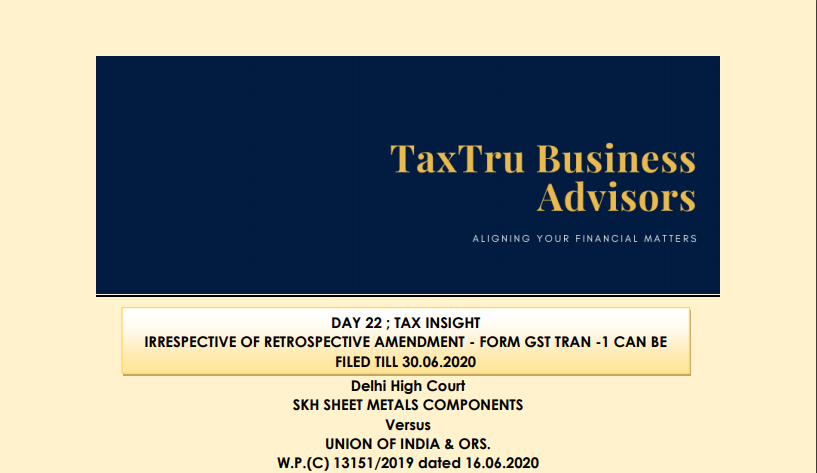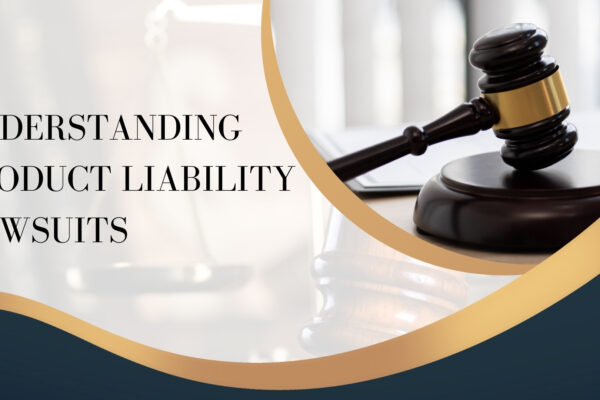Irrespective of Retrospective Amendment – Form GST TRAN -1 Can be Filed Till 30.06.2020
Table of Contents
- Irrespective of Retrospective Amendment – Form GST TRAN -1 Can be Filed Till 30.06.2020
- 1. Brief Background
- 2. Court’s Observation
- “Section 140 of the CGST Act 140.
- Rule 117 and Rule 117 (1A)
- As interpreting the above-said amendment, one can point out that:-
- Curious Case of The Word “TECHNICAL GLITCH/DIFFICULTY”
- Court’s Noteworthy Comments
- Our View:-
- Read the copy:
Irrespective of Retrospective Amendment – Form GST TRAN -1 Can be Filed Till 30.06.2020
Delhi High Court
SKH SHEET METALS COMPONENTS
Versus
UNION OF INDIA & ORS.
W.P.(C) 13151/2019 dated 16.06.2020
Delhi High Court held that in spite of the retrospective amendment in Section 140 of the CGST Act, 2017 its decision in case of Brand equity shall continue to apply with full rigor as the time limit has not been prescribed in the CGST Act.
Read the full text of the case here.
1. Brief Background
- Hon’ble Delhi High Court in the case of “BRAND EQUITY TREATIES LIMITED, MICROMAX INFORMATICS LTD., DEVELOPER GROUP INDIA PRIVATE LIMITED, And RELIANCE ELEKTRIK WORKS VERSUS THE UNION OF INDIA AND ORS.” has held that period of 90 days for claiming the input tax credit in TRAN-1 is a directory and therefore, the period of limitation of 3 years under the Limitation Act would apply.
- The Court has directed the Department to allow all assessees to claim the input tax credit in TRAN-1 by 30.6.2020. The direction would apply to all those who could not file TRAN-1 and claim the input tax credit.
- The court has further directed that it should be advertised that all taxpayers who have not filed TRAN 1 can do so by 30.6.2020. The judgment has been made applicable to all irrespective of whether the taxpayer has approached the court or not.
- After the aforesaid judgment, Section 128 of Finance Act, 2020 amends section 140, ibid to insert the words ‘within such time’ (w.e.f 01.07.2017).
- Notification No. 43/2020- Central Tax dated 16.05.2020 was issued notifying the effect of aforesaid retrospective amendment though it was not warranted in terms of Section 2 of Finance Act, 2020.
- The consequence of the amendment is that the Government has the power to prescribe the time limit for claiming Transitional Credit through the rules.
2. Court’s Observation
The Finance (Amendment) Act, 2020 And Its Impact; Judgement In Brand Equity
- Revenue counsel submitted a counter-affidavit that due to amendment made in Section 140 after the ‘Brand Equity’ Judgment, the effect of such judgment has been nullified.
- So, it was argued that now that the amendment specifically provides for prescribing a time limit for filing TRAN-1 Form, the period so provided under Rule 117 would have legal sanctity and therefore the factor which weighed with this Court to hold that the limitation period provided under Rule 117 for filing TRAN-1 is merely directory and not mandatory, no longer holds good.
Though the petitioner did not challenge the said amendment, the court cited that:-
- Nevertheless, all things considered, in spite of the amendment, we can say without hesitation that the said decision is not entirely resting on the fact that the CGST ACT did not prescribe for any time limit for availing the transition of the input tax credit. There are several other grounds and reasons enumerated in the said decision and discussed hereinafter, that continue to apply with full rigor even today, regardless of the amendment to Section 140 of the CGST Act.
Now, before proceeding further, let’s discuss the amended provisions for a better understanding of the court’s citing.
“Section 140 of the CGST Act 140.
(1) A registered person, other than a person opting to pay tax under section 10, shall be entitled to take, in his electronic credit ledger, the amount of CENVAT credit carried forward in the return relating to the period ending with the day immediately preceding the appointed day, furnished by him under the existing law within such time and in such manner as may be prescribed:
Rule 117 and Rule 117 (1A)
Tax or duty credit carried forward under any existing law or on goods held in stock on the appointed day.-
(1) Every registered person entitled to take credit of input tax under section 140 shall, within ninety days of the appointed day, submit a declaration electronically in FORM GST TRAN-1, duly signed, on the common portal specifying therein, separately, the amount of input tax credit of eligible duties and taxes, as defined in Explanation 2 to section 140, to which he is entitled under the provisions of the said section: Provided that the Commissioner may, on the recommendations of the Council, extend the period of ninety days by a not exceeding ninety days Provided further that where the inputs have been received from an Export Oriented Unit or a unit located in Electronic Hardware Technology Park, the credit shall be allowed to the extent as provided in sub-rule (7) of rule 3 of the CENVAT Credit Rules, 2004.
(1A) Notwithstanding anything contained in sub-rule (1), the Commissioner may, on the recommendations of the Council, extend the date for submitting the declaration electronically in FORM GST TRAN-1 by a further period not beyond [31st December 2019], in respect of registered persons who could not submit the said declaration by the due date on account of technical difficulties on the common portal and in respect of whom the Council has made a recommendation for such extension.
As interpreting the above-said amendment, one can point out that:-
- The first proviso of Rule 117, stipulates that the Commissioner on the recommendations of the Council can extend the period of ninety days for filing TRAN-1, by a further period, not exceeding ninety days.
- The Government amended the rules and introduced Sub-rule (1A) empowering the Commissioner to extend the date for submitting the declaration electronically in Form GST TRAN-I by a further period (not beyond 31.12.2019).
- This sub-rule is applicable to registered persons who could not submit the said declaration by the due date on account of technical difficulties on the common portal and in respect of whom the GST Council had made a recommendation for such extension.
- This Sub-rule (1A) begins with a non-obstante clause notwithstanding anything contained in Sub Rule (1).
- Thus, by introducing the said provision, notwithstanding the embargo introduced under Rule 117 (1) of the CGST Rules, the Government opened a narrow window for registered persons who faced technical difficulties on the common portal while filing Form TRAN-1. The Central Government has been consistently extending the time period for filing the Form TRAN-1 even beyond 31.12.2019 for those taxpayers who are covered by Rule 117 (1A).
- Recently in view of the order No. 01/2020-GST dated 7th February 2020 issued by Government of India, Ministry of Finance, the period was extended up to 31st March 2020.
- Thus, when we contrast the time limit stipulated under Rule 117 (1) and Rule 117(1A), we find that the time limit of 90 days is not respected.
- The court cited that, under none of the provisions of the Act, it can infer the intention of the legislature to create this distinction by way of subordinate legislation.
Curious Case of The Word “TECHNICAL GLITCH/DIFFICULTY”
- Rule 117 suffers from the vice of vagueness and concept of “technical difficulty on the common portal” and its applicability has not been adequately defined anywhere. Because of the absence of any defining words, there is no predictability about the application of this Rule for the class of cases to which it would apply, as is demonstrated in the case in hand. In the absence of criteria, the application of the provision would suffer from arbitrariness.
- It would be apposite to note that the GST Council in its 32nd meeting expanded the mandate of ITGRC to include those cases where the taxpayers who had been victims of the system failure, whether technical or otherwise. This becomes evident from the office memorandum of GST Council, dated 19th February 2019.
- Interestingly, the council mentioned the ‘NON TECHNICAL ERRORS’ as well.
Court’s Noteworthy Comments
- Both the Act and Rules do not provide any specific consequence on failure to adhere to the timelines. Since the consequences for non-consequence are not indicated, the provision has to be seen as the directory.
- If we interpret the timelines to be mandatory, the failure to fulfill the obligation of filing TRAN-1 within the stipulated period would seriously prejudice the taxpayers, for whose benefit section 140 has been provided by the legislature. In view of the above discussion, interpreting the procedural timelines to be mandatory would run counter to the intention of the legislature and defeat the purpose for which the transitionary provisions have been provided and have to be construed as directory and not mandatory.
- The case before us demonstrates how the tax department has miserably fallen short of the expectation. It is regrettable that Respondents have failed to address the basic and fundamental problem faced by the Petitioner that occurred while filing a Form, seemingly on account of a bona fide or inadvertent mistake. Instead of offering a restitute solution, they have stonewalled all the attempts made by the Petitioner The injustice and prejudice caused to the Petitioner is profound and its disillusionment and despair are evident.
Our View:-
1. We must not lose sight of the real intention of the Legislature that emerges by reading the scheme of the CGST, especially the transitional provisions and those dealing with ITC.
2. This is the reason courts have held that CENVAT credit which stood accrued to the Petitioner is a vested right and is protected under Article 300A of the Constitution of India and could not be taken away by the government, without the authority of law, on frivolous grounds which are untenable.
3. The GST Regime was introduced as a “TECHNOLOGY DRIVEN” tax regime. But unfortunately, the word ‘technical difficulties on common portal’ is not even defined and the wrath of technical issues was put forth on the genuine taxpayers who were just trying to transit the ‘Credit’ in the GST Regime.
4. It’s high time when the government should really think about these issues. Rather than introducing the retrospective amendments in the law, it should fix the voids.
5. Let me conclude by quoting Late. Hon’ble Arun Jaitley Ji, when he said “‘retrospective tax law had hurt the country by scaring away investors.
Read the copy:












